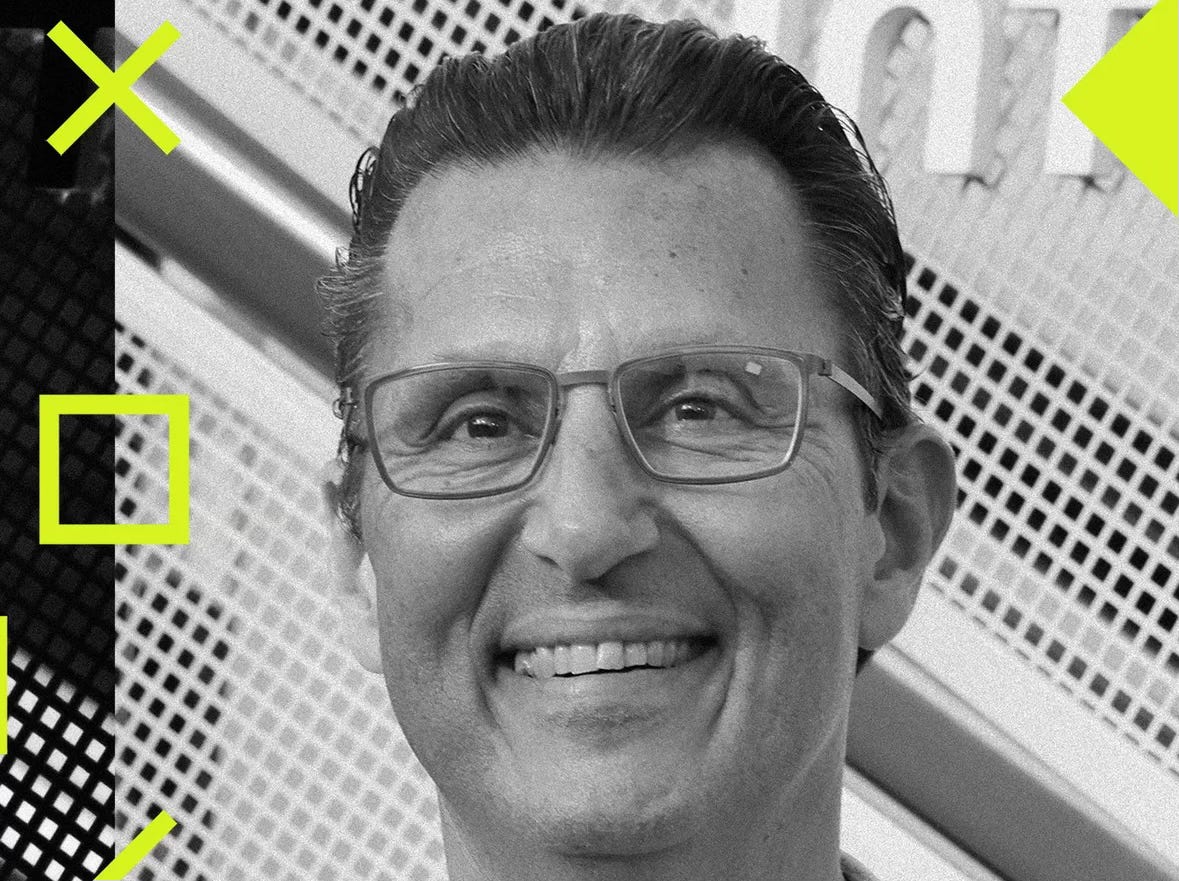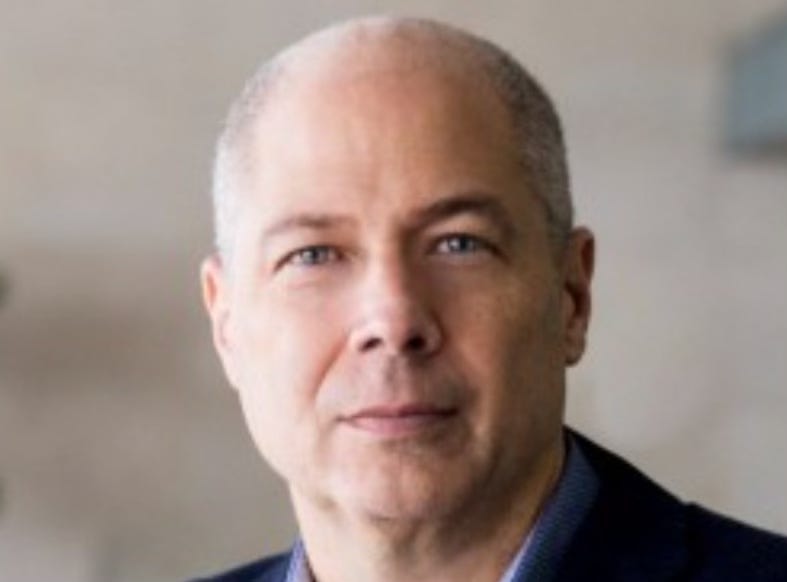Issue № 113 | London, Sunday 27 October 2024
Read on to learn why:
① Very few interview topics are damaging enough to even try to suppress.
② We want to look at things we’re told not to look at.
③ Private credit has become the driving force in the private investment world.
④ Stablecoins might become the dominant settlement and payment instrument.
⑤ When well targeted, sports sponsorship is effective but emotive.
⑥ Companies need mechanisms to consider ethical dilemmas as they arise.
⑦ Good marketers put their customers first.
What's new
The Verge interviewed Intuit’s CEO, Sasan Goodarzi, for its podcast this week but, before the episode aired, Intuit’s chief communications officer threatened the publication in an effort to suppress a portion of the recording. In a development that will come as a surprise to absolutely no one who reads IMTW regularly, things didn’t pan out so well for Intuit.

Nilay Patel, editor-in-cheif of The Verge, writes:
“I couldn’t have the CEO of Intuit on without asking about tax reform in the United States. Individual income taxes are more complicated in the US than in almost any other developed economy, and Intuit has been lobbying hard since the late 1990s to keep it that way to protect TurboTax, spending nearly $3.8 million in lobbying in 2023 alone. […] I asked about that, and Sasan disagreed with me, and we went back and forth for a few minutes on it.”
“Then I got a note from Rick Heineman, the chief communications officer at Intuit, who called the line of questioning and my tone ‘inappropriate,’ ‘egregious,’ and ‘disappointing’ and demanded that we delete that entire section of the recording. I mean, literally — he wrote a long email that ended with ‘at the very least the end portion of your interview should be deleted’. We don’t do that here at The Verge. As many of our listeners and readers know, we have a very explicit and very strict ethics policy.”
“I have to be honest with you — that’s one of the weirdest requests I’ve ever gotten. So here’s what we’re going to do: we’re going to run that whole part of the interview first, unedited, so you can tell me. It’s about five minutes long, and you can decide for yourself. Then we’ll come out of it, and we’ll run the rest of the interview, which, like I said, is an otherwise fascinating episode of Decoder.”
Why it matters
This story is a textbook example of how not to do PR. As if the Verge’s resulting coverage wasn’t bad enough (it was the number one story on the site all week), other outlets soon picked up the story too. If you’re in any doubt that this was the wrong tactic, one that was doomed to produce the exact opposite outcome it was aiming for, look no further than Gizmodo, The Verge’s competitor. They titled their coverage of the incident Here’s What TurboTax’s Boss Doesn’t Want You to Hear. Far from hushed, the story was amplified.
① One wonders whether Heineman came under pressure from Goodarzi who is perhaps overly sensitive about this topic. That’s the only explanation that occurs to me for why an experienced communications executive would kick an own goal like this. There are two glaring mistakes here. The first is a complete lack of judgement about what is damaging enough to even try to suppress. The reality is that the segment of the interview in question wasn’t contentious. Intuit may not have its lobbying against the IRS at the top of the list of topics it likes talking about but it had to expect a decent journalist to ask, and Goodarzi acquitted himself as well as can be expected when Patel did. Had Heineman not tried to have the segment cut, any reasonable person would have listened to the interview and thought nothing of it.
② The second is that coming down hard on a journalist, criticising their integrity and skill while trying to have them edit their work never produces the result you want. The only thing you’ll achieve is the Streisand effect. It’s obvious human nature: we want to look at and listen to things we’re told not to look at or listen to.
What to do about it
Take action
Over the years, I’ve offered you all the advice you need to handle these sorts of PR situations. When faced with a difficult topic:
Train and rehearse: Media interviews is a skill that can be taught. Be prepared.
Be empathetic: The best interviews are candid, informed, and interesting.
Tell the truth: It’s tempting to obfuscate or bend the facts to your narrative. Don’t. Tackle the question honestly.
Remain focused: Your PR efforts should be objective-driven and free of vanity.
Appear calm and confident: How you look is as important as what you say.
Get help
InMarketing serves senior leadership teams in finance or technology.
Top stories
The other articles that are worthy of your time.
FINANCE
How an ex-Goldman banker built a $10bn private credit ‘whale’ — and now may sell it
③ Private credit has become the driving force in the private investment world.
“Scott Kapnick, the chief executive of HPS Investment Partners, is closing in on a transformational transaction for the private credit firm he founded less than two decades ago at a potential valuation of $10bn or more.”
“HPS and its rivals are seen as an answer to the problem many asset managers are struggling with: how to secure a toehold in private credit. It is a nearly $2tn asset class that credit rating agency Moody’s estimates could swell to nearly $3tn by 2028.”
“Traditional heavyweights in the industry grapple with ageing buyout funds and investors who are reluctant to commit to new private equity vehicles. But at the same time, their credit funds have drawn in hundreds of billions of dollars of capital, with insurers and pensions clamouring for the higher yielding investments. Private credit funds took off in the wake of the financial crisis, after new regulation constrained banks’ lending.”
TECHNOLOGY
Stripe confirms acquisition of stablecoin firm Bridge
④ Stablecoins might become the dominant settlement and payment instrument.

“Stripe CEO Patrick Collison has confirmed on X that the company has acquired stablecoin infrastructure firm Bridge, describing stablecoins as ‘room-temperature superconductors for financial services’. The deal price was $1.1 billion.”
“Bridge provides B2B stablecoin infrastructure to help companies to support payments using stablecoins. Both companies are global orchestrators, Stripe with card and bank payments and Bridge with stablecoins. The startup developed infrastructure enabling developers to create applications that support instant cross border payments.”
“So far stablecoins have been mainly used for crypto and by people in economies with unstable currencies. Bridge was one of the companies likely to help stablecoins go mainstream. The timeframe just got shorter. If banks want to compete with tokenised deposits, they may need to move faster.”
MEDIA & MARKETING
Chanel dips oar into sport with Oxford-Cambridge boat race tie-up
⑤ When well targeted, sports sponsorship is effective but emotive.
“The annual boat race between Oxford and Cambridge universities is to be renamed after a designer watch as part of a multiyear tie-up with Chanel, in what is the French fashion house’s first foray into sport sponsorship.”
“From next year, the annual rowing contest will be rebranded as ‘The Chanel J12 Boat Race’, taking on the name of a high-end timepiece produced by the privately owned luxury goods company.
“Chanel will replace Gemini, a cryptocurrency exchange founded by the Winklevoss twins, as the event’s title partner and become its official timekeeper.”
WILDCARD
How to manage politics in the workplace
⑥ Companies need mechanisms to consider ethical dilemmas as they arise.

“Political polarisation is not something that can easily be suppressed; it might erupt in specific firestorms or it might take hold more insidiously. “
“The benefits of diversity can extend to political views: partisanship can limit your market, narrow your employee base and hurt your business.”
“Bosses who want to act in a non-partisan way need to develop a process for dealing with polarisation, rather than responding on an ad hoc basis. […] Rabobank, a Dutch lender, has a long-standing ethics committee to consider dilemmas, from whether its staff can trade cryptocurrencies to the use of client data. Politicians have parliaments. Firms may need an equivalent.”
Off cuts
The stories that almost made this week’s newsletter.
FINANCE
👩🏻💼 HSBC announces restructuring and names first female C.F.O.
🤝 Barclays profits rise 23% as dealmaking returns
💷 Lloyds reveals stronger-than-expected profit as consumer confidence picks up
💻 Santander expands US presence with nationwide digital bank launch
↗️ Natwest shares soar as lender lifts performance forecasts
TECHNOLOGY
😩 Buy now, pain later — the looming risks of BNPL
💶 Fintech funding bucks the downward trend across Europe
📚 Three books to read about AI in the fintech sector
👮🏻♂️ Goldman and Apple fined $89mn over US credit card programme
📈 Standard Chartered says new DLT-based system is already profitable
MEDIA & MARKETING
👫 How martech is reshaping marketing teams
✅ Forty one-sentence marketing tips
✍🏻 When you’re told you’re not strategic enough
☀️ Bluesky reaches 13 million users, announces new funding
📲 WhatsApp expands private mentions in status to all users
The last word
⑦ Steve Rotter, CMO at DeepL, on B2B tech marketing fundamentals:

“What’s really important is making sure efforts focus on every aspect of the customer journey. For marketing teams to be effective and drive growth, they have to know customer pain points and how they discover and evaluate solutions.”
Don’t settle for marketing.
Strive for InMarketing.
Wishing you a productive week,
P.S. Wondering who is going to win the US election? Let’s meet for a drink.








